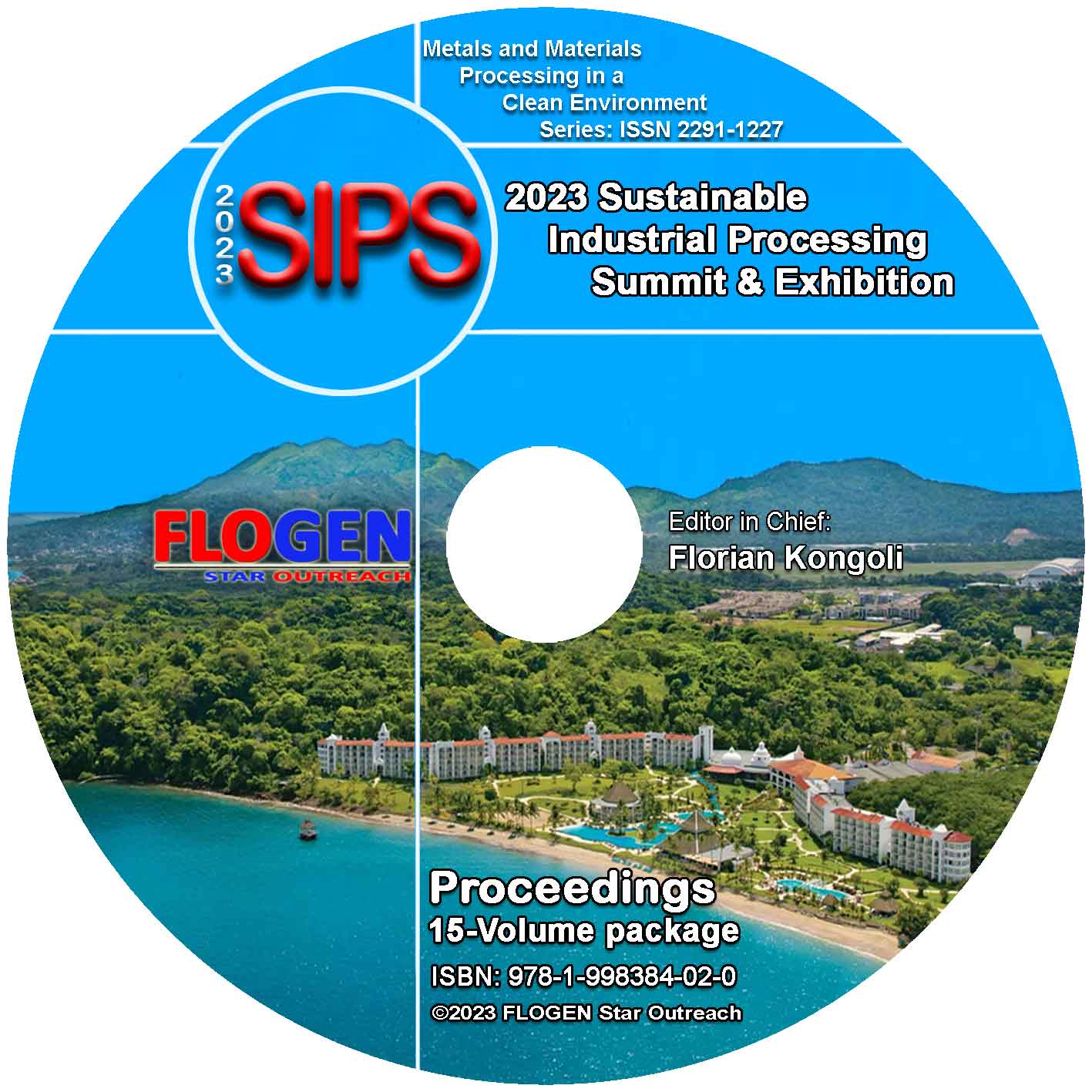2023-Sustainable Industrial Processing Summit
SIPS2023 Volume 13. Intl. Symp on Physics, Mathematics and Multiscale Mechanics
| Editors: | F. Kongoli, A. B. Bhattacharya, A.C. Pandey, G. Sandhu, F. Quattrocchi, L. Sajo-Bohus, S. Singh, H.S. Virk, R.M. Santilli, M. Mikalajunas, E. Aifantis, T. Vougiouklis, P. Mandell, E. Suhir, D. Bammann, J. Baumgardner, M. Horstemeyer, N. Morgan, R. Prabhu, A. Rajendran |
| Publisher: | Flogen Star OUTREACH |
| Publication Year: | 2023 |
| Pages: | 298 pages |
| ISBN: | 978-1-989820-96-4 (CD) |
| ISSN: | 2291-1227 (Metals and Materials Processing in a Clean Environment Series) |

CD shopping page
THE CHALLENGES AND OPPORTUNITIES OF SAMARCO TOWARD 2050 SUSTANINABLE AGENDA
Rodrigo Alvarenga Vilela1; Felipe Otavio Morato2; Thiago Marchezi Doellinger3; Giovanni Felice Salierno4;1SAMARCO, , Brazil; 2SAMARCO, Anchieta, Brazil; 3SAMARCO MINERAçãO SA, Belo Horizonte, Brazil; 4SAMARCO MINERAçãO S/A, Ouro Preto, Brazil;
Type of Paper: General Plenary
Id Paper: 305
Topic: 46
Abstract:
Samarco is a Mining Brazilian company that produce pellets in an integrated from the mine to the port since 1977.
Samarco journey has faced challenges, notably the Fundão dam collapse on November 5th, 2015, causing several damages, includding the environment and impacting the lives of the community and five-year operational interruption. During this period, Samarco remained committed to remediation and compensation, implementing significant improvements based on lessons learned. The company invested in an Integrated Safety System, risk management, prevention culture, and new technologies for tailings disposal [1].
Central to Samarco's commitment is the reparation and compensation for the affected communities and areas. [2] By June 2023, R$30.7 billion were allocated to such actions, with R$14.38 billion already disbursed in indemnities and emergency financial aid to more than 423.7 thousand individuals, managed by the Fundação Renova—an autonomous, non-profit entity tasked with repairing the impacts caused by the Fundão dam broke.
In its recovery journey, Samarco resumed operations in 2020, eliminating dams for tailings storage, and reinforcing its Integrated Safety System through robust engineering and state-of-the-art technology, including the Monitoring and Inspection Center (CMI). [1] The CMI closely monitors geotechnical structures 24/7 using over 1,700 state-of-the-art equipment pieces, providing real-time data to a specialized team for enhanced safety.
In the pursuit of global decarbonization goals, the steel production chain plays a significant role, accounting for 7% of global CO2 emissions [3]. The Paris Agreement has spurred developments aimed at mitigating emissions and achieving a positive balance between anthropogenic sources. The urgent need to achieve zero net emissions by 2050 necessitates collective efforts.
Samarco stands as a pioneer in the mining of low-grade iron ore in Brazil, boasting an integrated logistics operation from mine to port, with a unique pipeline solution established in the 1970s. This innovation not only ensures greater safety but also mitigates socioenvironmental impact. Operating since 1977, Samarco has transformed low-grade material (itabiritic ore) into a high-value product, with around 67% iron content and high reducibility index, enhancing productivity for steel industries and direct reduction furnaces [1].
Seeking a sustainable 2050, Samarco has actively invested in incremental and transformational innovations, mobilizing over R$10 million in 2022 alone [2]. This dedication has yielded crucial projects such as dry stacking of tailings and optimization of Concentrator 3 desliming, resulting in a 9% reduction in slime generation. Moreover, the Advanced Process Control System (SCAP) has significantly reduced consumption of inputs and energy in various stages of production [2].
Samarco's pellets play a pivotal role in decarbonizing the steel industry. By adopting energy matrix changes and employing charcoal to replace pet coke, Samarco has achieved substantial reductions in CO2 consumption and emissions, reflecting positively on iron and steelmaking industries [4].
Aligned with its sustainability roadmap, Samarco has set a CO2 emission timeline for its 2050 agenda. Key milestones have already been achieved, transitioning from oil to natural gas in the pelletizing furnace in 2010, and adopting 100% renewable electricity for operations from 2021, alongside comprehensive carbon footprint inventory restatement. The company also contributes to environmental matters by utilizing marble and granite residues, removing significant waste from the environment and promoting circular economy practices [2].
In recognition of its transparent management of greenhouse gases (GHG), Samarco was awarded the gold seal by the GHG Protocol Brazilian Program in early 2022. The company has mapped GHG inventory up to its clients' gates in 2023, underscoring its commitment to achieve a net-zero carbon footprint by 2050.
In conclusion, Samarco's journey towards sustainability is marked by its dedication to reparation, compensation, and technological advancements, all aimed at achieving a greener and sustainable future. As it overcomes challenges and embraces opportunities, Samarco sets an example for the global steel industry in its pursuit of a sustainable 2050 agenda.
Keywords:
CO2; Emissions; Iron; Metallurgy; Pellets; Process; Steel; Sustainability; TechnologyReferences:
[1] IEA (2020), Iron and Steel Technology Roadmap, IEA, Paris https://www.iea.org/reports/iron-and-steel-technology-roadmap, License: CC BY 4.0[2] SAMARCO (2023), Brasil. https://www.samarco.com/?lang=en
[3] Bueno, PlÃnio Gomes, Metallurgical characteristics of Samarco Mineração’s product portfolio and their influences on Western European blast furnace operations [manuscrito] / PlÃnio Gomes Bueno. - 2015
[4] Bailon, Ana Maria Guilherme; Tavares, Luis Marcelo; Morato, Felipe Otávio; Silva, Ricardo Jose da; Klein, Arthur Trindade; Nunes, Sergio Fernando; Callado, Pedro Berg. USO DE BLOCOS DE RESÃDUOS DE LAVRA DO MARMORE EM PELOTAS DE MINÉRIO DE FERRO , p. 188-198. In: 8° Simpósio Brasileiro de Aglomeração de Minérios, São Paulo, 2022
[5] SAMARCO (2023) Sustainability report 2022, Brasil. https://www.samarco.com/wp-content/uploads/2023/04/Samarco_Management-Report-2022-1.pdf